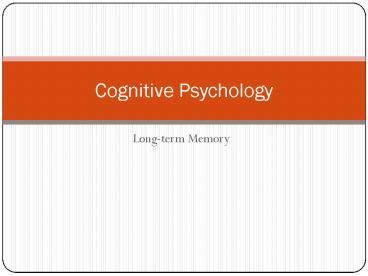Longterm Memory - PowerPoint PPT Presentation
1 / 14
Title:
Longterm Memory
Description:
Experimental group filled in table 49% of the time. Control group only 30 ... Zajonc study. Effect occurs even without explicit memory of familiarity. Illusion ... – PowerPoint PPT presentation
Number of Views:44
Avg rating:3.0/5.0
Title: Longterm Memory
1
Cognitive Psychology
- Long-term Memory
2
Types of Long-term memory
- Memory is not all the same
- Dissociations occur various manipulations affect
one type of memory, but not the other. - Common dissociations brain injury and amnesia.
3
Types of Long-term memory
4
- Implicit vs. Explicit memory
- Explicit Memory with awareness
- Implicit Memory without awareness
- Declarative vs. nondeclarative
- memory that we can declare. Book knowledge
5
- Explicit memory
- Semantic vs. episodic
- Semantic memory of the meaning of words, facts,
etc. - Episodic memory of specific episodes
- autobiographical memories.
- Certain amnesics are lacking in episodic memory
but not semantic - Infantile amnesia shows problems specifically
with episodic - Tests of episodic and semantic memory do not
correlate well.
6
Implicit memory
- Memory without awareness
- Several examples
- Pavlovian conditioning
- Procedural memory
- Priming
- Pavlovian conditioning stimuli become
associated together - We do not have to be aware
7
- Procedural memory memory for how to do things.
- Ride a bike
- How to type
- Once we have this memory, we automatically
perform it.
8
- Priming facilitated response to a stimulus that
has recently been experienced. - Memory has been primed.
- Expose subjects to a list of words
- Now ask them to solve problems
- Stem-completion tasks missing letters of words
must be filled in - Wheel of fortune style
- E.g., _ _ l f,
- E.g., t a b _ _
9
- Results Repetition priming - prior exposure to
words enhances stem-completion tasks - E.g., Rajaram Roediger (1993) prior exposure
to the word table in experimental condition.
Control group no exposure - Experimental group filled in table 49 of the
time - Control group only 30
- Some memory must be there
- Participants do not explicitly remember seeing
table before.
10
- Lexical-decision tasks
- Given list of words
- Push a button if it an English word
- Ex. DESK, JOKE, KIJE
- Responses show effects of repetition priming
- Benefits even without explicit recall
- Direct test of memory recognition
- Dissociations
- No evidence of memory in direct test
- Memory present in lexical-decision task
11
Mere-exposure effect
- Subjects rate familiar objects as more favorable
than unfamiliar - Zajonc study
- Effect occurs even without explicit memory of
familiarity
12
Illusion of truth
- Dissociation between explicit and implicit memory
- Presentation of false statements
- More crediblity to statements because of
familiarity - Illusion of fame
- Ex. Jacoby et al (1989)
- Source error
13
- Misattribution
- Jacoby et al (1988)
- Repetition priming and judgments of noise
- Illusions of control
- Role of implicit memory
- Nisbett and Wilson (1977)
14
- Flashbulb memories- memory for a traumatic or
important event - Special type of memory for emotionally
significant memories - Tend to be very strong and people are confident
in them - Challenger study
- 9/11
- Showed that flashbulb memories are very similar
to regular ones except for the confidence of them.































